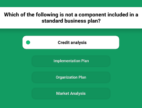10 Crucial Things To Know Before Starting A Business
by Arina Smith Business Planning Published on: 22 September 2021 Last Updated on: 23 September 2021

Being an entrepreneur is both a dream and a worthwhile financial goal for many people. Despite this, only 4% of newly established enterprises survive for ten years.
In fact, more than half of all small firms fail before their fifth year. This is due to the fact that the majority of people are unaware of the numerous factors to consider while starting a new business.
Deciding to start a business is a huge decision. It isn’t all roses, and it’s certainly not as simple as some people make it out to be. Usually, there are obstacles to overcome and challenges that keep coming up. It often feels like there are a thousand things to work on at once.
With a little planning, it can become easy to manage expectations and execute actions towards establishing and growing your business.
They say that a job well started is half done. So, if you want to start a business, you must have the necessary information.
Best 10 Things Every Newbie Business Owner Needs To Know In 2021

Directing a new business towards success in the long term is a daunting and lengthy process. However, following the below checklist can give you a better understanding of the priority tasks.
1. Starting A Business Is Hard Work

Many people enter certain businesses because they are passionate about them. The fact is, passion is only a small part of what goes into running a business.
Yes, you get to do what you love, but you’ll have to devote even more time to building company plans, engaging with consumers, selling your products, and dealing with the tedious paperwork.
So, if you do decide to start a business, be prepared to do the not-so-fun stuff as well.
2. Get Legally Squared Ahead Of Time
Before registering, you must first determine the type of entity your firm is. Your business structure has legal implications ranging from how you file your taxes to your personal liability if something goes wrong.
- Sole Proprietorship: You can file for a sole proprietorship if you own the business wholly by yourself and intend to be solely liable for all debts and liabilities. Be aware that using this approach can have a negative impact on your personal credit.
- Partnership: A business partnership, as the name implies, means that two or more people are held individually liable as business owners. If you have a business partner with complimentary abilities to your own, you won’t have to go it alone. It’s usually a great idea to bring someone in to assist your business to succeed.
- Corporation: You may wish to consider founding one of the various forms of companies if you want to segregate your personal liability from that of your company. However, each sort of corporation has its own set of rules.
- Limited liability company (LLC): The limited liability company is one of the most typical structures for small businesses. This hybrid organization combines the legal advantages of a corporation with the tax advantages of a partnership.
In the end, you must decide which sort of business is suitable for your current needs and future business objectives. It’s critical to understand the many legal business formats that are accessible. If you’re having trouble making a decision, it’s a good idea to consult with a business or legal advisor.
3. Keep A Track Of Your Finances

Before you start a business, you must make some financial considerations, which include your own financial situation.
Do you know why many businesses fail? Because they become bankrupt before becoming profitable. Therefore, always overestimate the amount of startup capital you’ll need because it might take a long time for a business to start generating consistent revenue.
Eliminate any superfluous financial responsibilities and determine the very least you can survive on. Consider your income: will you work full-time and start a side business? Or do you intend to work part-time? Or will you go all-in?
Starting a business is costly, so you must have to figure out how you’ll pay for it. Are you able to self-fund your business, or will you need to borrow money? If you wish to leave your current job to focus on your business, do you have enough money to help you survive for the next six months or a year or at least until you are able to make a substantial profit?
Knowing about your startup expenditure is crucial for starting a successful business.
4. Build A Brand From Day One

Before starting your business, you must first establish your brand and gather a following of individuals who will be ready to jump when your actual or figurative doors open for business.
- Website of the company: Create a corporate website based on your online reputation. Many customers use the internet to discover more about a company, and a website serves as digital confirmation that your company exists. It’s also a fantastic opportunity to communicate with prospective customers.
- Social media: Use social media to get the word out about your new business and use it as a promotional tool to give coupons and discounts to followers once you’ve launched.
- Logo: Create a logo that allows people to quickly recognize your company and use it consistently across all of your channels.
You must maintain these digital assets by adding relevant, entertaining content about your business and industry on a regular basis.
5. Focus On Building The Right Team

As Henry Ford rightly said, “coming together is a beginning, staying together is progress, and working together is a success.”
You can’t manage a profitable business on your own. No matter how hard you try, there will always be something you are not good enough at. You might be able to do it at first, but as your business expands and the work piles up, you’ll realize you need help.
This is where you must proceed with caution, as selecting a team that doesn’t share the same growth mindset can be devastating for your company.
Make sure that the people you hire have goals that are similar to yours and that they are willing to assist you in running the company as if it were their own.
6. Up Your Selling Game With Compelling Presentations

One of the hardcore truths about business is that you have to sell all the time. No matter what or to whom, you need to champion sales. Sometimes it would be your idea, sometimes product, and sometimes collaborations. To do so effectively, presentation skills will matter.
It is the part that can make or break your business relationships. But here’s the thing.
Making a dent in your audience’s mind with a presentation isn’t always easy. It takes the right balance of design and value to bring out the most impressive conversations. However, to ease this process, we have a suggestion.
You can make use of the free presentation template designs that Pitch has to offer.
7. Staying Busy Does Is Not Equal To Being Productive
There are numerous things you may do that will have no effect on the growth of your company. It’s all too simple to mix up expansion and growth.
Thus, adding a new office, additional workers, or even a new product feature does not translate to growth if you do not see an increase in earnings and customers.
As a result, knowing the difference between expansion and growth is critical so that you can be able to assess how well your business is performing.
8. Use Traditional Modes Of Marketing
If you’re starting a business, you should have an understanding of what booklet printing is and why it’s important. A booklet printing is a common marketing tool that is used to promote a business, its products, or services. It sends the message that your business is competent, dependable, and dedicated to excellence.
The booklet is an important aspect of your branding process, alongside your website, social networking, advertising, and marketing efforts.
A well-designed booklet is an excellent way to introduce your business. It also raises your business’s visibility. Therefore, to expand your business and reach out to more people, consider creating a booklet if you don’t already have one on hand.
9. Focus On Building Relationships

Nobody wants to do business with a brand that has no name or face. Therefore, it’s critical to actively connect and build a relationship with your audience. Make your social media channels, blogs, websites, and other online properties as engaging as possible, and ensure to reply to queries promptly. This allows you to receive direct feedback from customers while also establishing yourself as an authority figure.
Also, do a deep dive into the life of your target customer. Figure out what problems they have and what their perspective is.
The more you know about your customers, the more effective your message will be, and ultimately the less money you’ll have to spend on marketing.
10. Purchase An Insurance Policy

It may slip your mind as something you’ll “get around to” later, but getting the correct insurance for your business is a crucial step to do before you start. Dealing with accidents like property damage, theft, or even a consumer lawsuit can be expensive, so you need to make sure you’re covered.
Although there are various forms of business insurance to choose from, most small firms can benefit from a few basic insurance programs. If your company has employees, you will need to obtain workers’ compensation and unemployment insurance.
Depending on your location and business, you may want additional coverage. You can always kickstart with integrating general liability (GL) insurance, popularly known as a business
owner’s policy. Integrating professional liability insurance is also a great way to ensure complete protection from any unintended mistakes or errors in business operations.
Conclusion
Starting a business can be exciting and intimidating at the same time. But remember every great business takes time. There is no overnight success.
However, do not forget to do your homework before starting a business. And take steady, deliberate actions. The recommendations listed above can help your business function smoothly and boost your chances of success.
While mistakes will undoubtedly be made at your startup, knowing the knowledge early on can enable you to handle them and your business better.
Read Also:







































































































